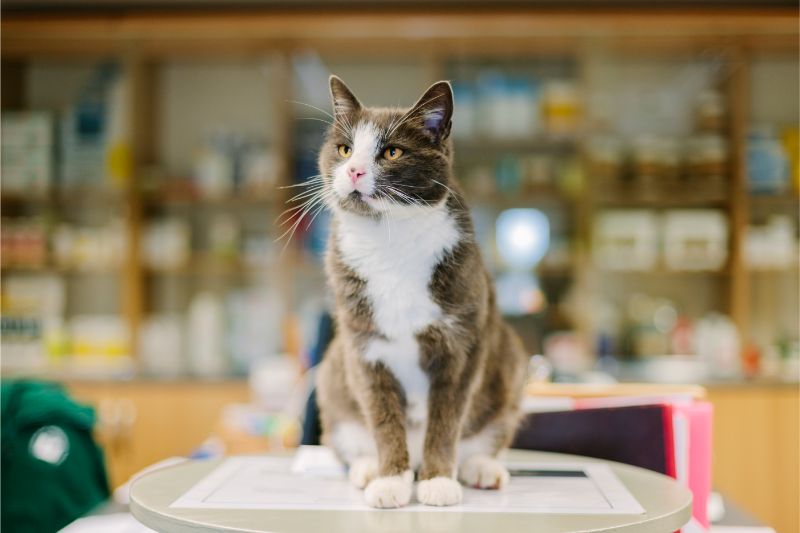Pancreatitis in Dogs: Talking Turkey

It’s the holiday season, and nothing says family like Thanksgiving dinner. And since over 70% of pet owners consider their pets family, it’s only natural to want to include them in any planned holiday celebrations, including sharing the holiday feast.
But while you’re at the table (and during the prep and clean-up, too), it’s essential to remember that our pets may experience GI upset, diarrhea, and vomiting – or worse – from partaking in the holiday meal with us. Ingestion of fatty foods and even any sudden change in diet can cause a painful condition called pancreatitis.
Continue…Skin Cancer in Pets

Your pets may enjoy their time in the sun as much as you do this summer. And although they may love basking in the warm rays, skin cancer is a risk for pets just as it is for humans. According to the American Kennel Club (AKC), skin cancer is the most common type of cancer diagnosed in dogs. Cats, too, are often affected by skin cancer, especially cats with short hair, light-colored coats, and lots of sun exposure. Regular annual wellness visits with your veterinarian are essential, including a complete nose-to-tail physical exam and looking for signs of skin cancer. Your pet’s veterinarian can detect skin cancer at these visits, but it’s also essential for pet owners to understand and recognize signs of pet skin cancer, especially as pets age.
Continue…How to Prevent Lyme Disease In Pets

You may be hearing more about Lyme disease recently, and for good reason. Current estimates from the CDC show that 300,000 to 400,000 people in the US are diagnosed or treated for Lyme disease yearly. The disease affects humans and animals and, if left untreated, can result in painful complications.
Lyme disease is a bacterial infection transmitted by the bite of an infected tick. The bacterium Borrelia burgdorferi is responsible for Lyme disease, which has become the most common vector-borne disease in the United States.
With spring rains, moist air, and tall, green grass, now is the time to prevent this debilitating disease’s spread to your pets. Felton Veterinary Hospital shares a few tips for how to keep your best friend safe.
Continue…Diabetes in Pets

It’s pet diabetes month, and what better way to focus on this common issue in cats and dogs than with help from your Felton Veterinary Hospital team? When we think about diabetes, our pets may not be at the top of our minds, but this debilitating disease is rising in both people and pets alike. According to Banfield Pet Hospital’s 2016 State of Pet Health Report, diabetes in dogs increased by nearly 80 percent from 2006 to 2015.
Diabetes is more common in middle-aged and older pets, but any pet can be affected. In addition, the disease commonly leads to other conditions, such as heart, kidney, and liver disease and cataracts. So pet owners must be aware of the risks and signs of diabetes in pets and how to prevent this disease from affecting their beloved pet.
The good news is that with early detection, you and your veterinarian can successfully manage the disease through diet, exercise, regular monitoring, and treatment. With mindful interventions, pets with diabetes can still live healthy, long lives.
Continue…The Heart of the Matter: Dilated Cardiomyopathy

February is the month of Valentine hearts and flowers, but did you know that it’s also American Heart Month? To celebrate, Felton Veterinary Hospital is shining a spotlight on pet heart health by focusing on the signs of heart disease in pets, and what pet owners can do to prevent it.
Nearly ten percent of pets suffer from heart disease. Like humans, animals experience different forms of heart disease – some that are genetic or age-related, and some that develop from other health issues. While many heart problems cannot be prevented, pets can still enjoy healthy, long lives with early detection of disease, careful management, and a healthy lifestyle. Continue…
The Light Fantastic: Laser Therapy For Pets

Is your older kitty “slowing down?” Has your agility dog suffered an injury that just won’t heal? In these and many other scenarios, it’s possible that laser therapy could be the answer to your pet’s pain and discomfort.
Used for years in humans, laser therapy for pets uses Class IV laser light to stimulate healthy cell growth, repair damaged cells, and promote healing and pain relief.
At Felton Veterinary Hospital, we are proud to offer this therapy, and we are thrilled to share the benefits with our patients and friends.
Continue…Much Ado About Canine Flu

This winter has been quite the flu season! Many of us were ill thanks to the dreaded human flu, and we’re glad to finally be seeing the light at the end of the tunnel. It’s interesting that canine flu has recently become a focus, especially in dog-loving circles. And while it’s not seasonal, and it’s not new, there are a few things that the team at Felton Veterinary Hospital thought you should know about this disease that affects our best friends.
Canine Flu Basics
There are two strains of Canine Influenza Virus (CIV). The most recent strain (H3N2) was identified following an outbreak in March of 2015 and affected dogs in the Chicago area. There have now been a few thousand cases of H3N2 reported in 30 states. There’s no evidence that H3N2 can infect people.
Continue…Pet Poisoning: Prevention Is Key

Our four-legged friends tend to be active and adventurous, and we love that about them! However, at times they can – shall we say – “get into things” that they shouldn’t. Hopefully, your pets have never ingested anything that caused a pet emergency, but it’s always great to be prepared!
As we spring into spring, we’re all itching to get outside. It’s amazing (and somewhat scary!) how many potential poisons are in and around the average garden, yard, and home. With that in mind, Felton Veterinary Hospital has put together here a few tips and ideas for how to prevent pet poisoning at home.
Continue…Heartworm
What Happens in Heartworm Disease
By Wendy C. Brooks DVM, DABVP
Heartworm Disease vs. Heartworm Infection
Before reviewing the clinical signs seen in heartworm disease, an important distinction must be made between heartworm disease and heartworm infection. Heartworm infection by definition means the host animal (generally a dog) is parasitized by at least one life stage of the heartworm (Dirofilaria immitis). Dogs with heartworms in their bodies do not necessarily have adult worms in their hearts; they may have larval heartworms in their skin only. Dogs with heartworms in their bodies are not necessarily sick, either. Dogs with only larvae of one stage or another are not sick and it is controversial how dangerous it is for a dog to have only one or two adult heartworms. These dogs are certainly infected but they do not have heartworm disease.
Fleas
Fleas: Know your Enemy
Despite numerous technological advances, fleas continue to represent a potentially lethal plague upon our pets. Current products are effective so there is little reason for this; the problem seems to be one of understanding.
There are over 1900 flea species in the world. Pet owners are concerned with only one: Ctenocephalides felis, the cat flea. This is the flea that we find on our pets (cats, dogs, rabbits, and other species) in 99.9% of cases and in order to understand how to control the damage caused by this tiny little animal, you should learn all you can about it.


 Schedule an Appointment
Schedule an Appointment